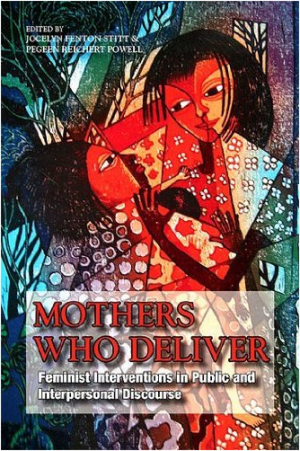Mothers Who Deliver: Feminist Interventions in Public and Interpersonal Discourse

While the field of mothering studies is approximately thirty years old, there’s no question that the experience of motherhood and the accompanying discourse and silence that surround it has existed for far longer. In this academic anthology, Stitt and Powell cast a wide net into this interdisciplinary field, bringing back articles that speak to everything from the “mommyblogging” revolution to single mothers’ groups and how they operate on university campuses. It is a bit broad for a text that comes in under 315 pages, but then again, it seems that attempting to narrow this field of study would be counterintuitive. The message of mothering studies scholars is clear: each mother’s experience deserves exploration.
The book is divided into two parts: “Feminist Interventions in Public Discourse,” and “Feminist Interventions in Interpersonal Discourse.” That organizational style doesn’t help or hurt the book since it’s a well-curated set of articles, but it is interesting to think about the public and private spheres that mothering dually occupies. In a feminist collection like this, it is difficult to highlight certain articles over others, especially because readers know how intimate these experiences are. However, there are certain pieces in this anthology that truly do stand apart from the rest. “Cyborg Mothering” by Shelley Park offers a unique, maternal perspective on technology. This is a woman who once refused to own a cell phone because she didn’t want to be in constant contact with anyone. Upon her separation from her husband and as a result of their joint custody of their two daughters, that same woman now relies on that mobile device and various web tools to maintain a presence in her daughters’ lives when they spend time with her ex-husband. It’s fascinating to see technology in this light, as a tool that truly does keep the lines of communication open, rather than as a distraction or a way to connect with an old high school friend.
Lynn Kuechle offers her thoughts on the current lack of mothering scripts, and expresses her frustration as a master’s student in speech communication and a mother, which culminates in a series of monologues about mothering. When read against another article in this text, “Mommyblogging Is a Radical Act!: Weblog Communities and the Construction of Maternal Identity,” one begins to question what “lack of mothering scripts” Kuechle is referring to. According to Lisa Hammond, mommybloggers are rewriting scripts every day on the web. The issues like these that are raised by the mere combination of articles in this text are the most rewarding aspects of reading Mothers Who Deliver. The articles themselves promote introspection, but it is the act of reading them in the same space against seemingly disparate articles that fosters questioning and eventual understanding of just how personal and political a field like mothering studies can be.